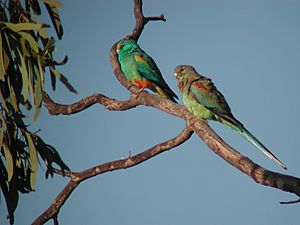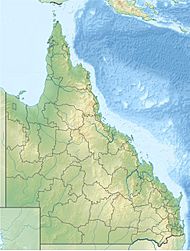Currawinya National Park facts for kids
Quick facts for kids Currawinya National ParkQueensland |
|
|---|---|
|
IUCN Category II (National Park)
|
|
| Nearest town or city | Hungerford |
| Established | 1991 |
| Area | 1,513 km2 (584.2 sq mi) |
| Managing authorities | Queensland Parks and Wildlife Service |
| Website | Currawinya National Park |
| Footnotes | |
| Official name: Currawinya Lakes | |
| Designated: | 11 March 1996 |
| Reference #: | 791 |
| See also | Protected areas of Queensland |
Currawinya National Park is a special natural area in South West Queensland, Australia. It is located near the town of Hungerford. The park is about 828 kilometers (514 miles) west of Brisbane, the capital city of Queensland.
This park is part of the "mulga lands" region. This means it has dry, sandy plains with small trees and shrubs. The Paroo River flows through the park, bringing important water to the area.
Contents
History of Currawinya National Park
Currawinya National Park has a rich history. It holds many important cultural sites for Indigenous Australians. These sites show that Aboriginal people have lived and used the wetlands in the park for a very long time.
Before it became a national park, the land was used for raising livestock. In 1991, the Government of Queensland bought two large properties. These were named Currawinya and Caiwarro Homestead. You can still see parts of the old homestead, machinery, and a levee bank today.
In 2015, the park became much bigger. The state government bought three more properties next to it. This made the park's size double!

Nature and Wildlife
The park is home to two very important lakes: Lake Numalla and Lake Wyara. These lakes are recognized as Ramsar wetland sites. This means they are important wetlands for the whole world.
Lake Numalla has fresh water, while Lake Wyara has salty water. These lakes are vital places for waterbirds. They provide a safe home during dry times. Many migrating birds also stop here as they travel across Australia. Over 200 different kinds of birds have been seen in the park.
Most of the park is part of the Paroo Floodplain and Currawinya Important Bird Area. This area is special because it can support huge numbers of waterbirds when conditions are right. In total, 14 different species of animals and plants that are considered threatened have been found in the park.
Protecting Bilbies
One special part of the park is a large area for bilbies. A bilby is a small, rabbit-like marsupial native to Australia. This area is 25 square kilometers (about 9.6 square miles) in size. It is surrounded by a special fence that keeps out predators. This fence is designed to protect the bilbies from animals like feral cats and foxes.
The electric fence was first opened in 2001. Bilbies that were raised in captivity or rescued used to do very well inside this safe area. However, the fence was damaged by floods in late 2011 and early 2012. This allowed feral cats to get inside. It has been hard to remove these cats. Because of this, new bilbies are not being placed in the enclosure until the number of feral cats is very low.
Things to Do
Currawinya National Park offers fun activities for visitors. You can enjoy fishing, canoeing, and swimming in the park's waters.
See also
 In Spanish: Parque nacional Currawinya para niños
In Spanish: Parque nacional Currawinya para niños
 | Janet Taylor Pickett |
 | Synthia Saint James |
 | Howardena Pindell |
 | Faith Ringgold |


